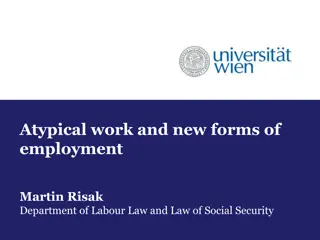
Equality Act 2010 and Atypical Workers in Employment Context
Learn about the Equality Act 2010 which protects individuals from discrimination based on various characteristics such as age, disability, sex, and more. Discover how the act addresses direct discrimination and the prevention of less favorable treatment for atypical workers like part-time employees and fixed-term contract workers. Understand the regulations and rights associated with part-time workers to ensure equal treatment in the workplace.
Download Presentation

Please find below an Image/Link to download the presentation.
The content on the website is provided AS IS for your information and personal use only. It may not be sold, licensed, or shared on other websites without obtaining consent from the author. If you encounter any issues during the download, it is possible that the publisher has removed the file from their server.
You are allowed to download the files provided on this website for personal or commercial use, subject to the condition that they are used lawfully. All files are the property of their respective owners.
The content on the website is provided AS IS for your information and personal use only. It may not be sold, licensed, or shared on other websites without obtaining consent from the author.
E N D
Presentation Transcript
Equality Act 2010 As we will see in a later lecture discrimination is protected by the Equality Act 2010. There are 9 protected characteristics Age Disability Marriage and Civil Partnership Pregnancy and Maternity Sex Sexual Orientation Race Religion or Belief Gender Realignment
S13 Equality Act Deals with direct discrimination Less favourable treatment because of a protected characteristic. These provision apply to all workers, regardless of status
Lecture focuses on less favourable treatment of Atypical worker those who are not on traditional contracts Less favourable treatment instead of because of a PC but because the individual is:- A part time employee Working on a fixed term contract employees An ex offenders
Part-Time Employees Part Time Workers (Prevention of Less Favourable Treatment) Regulations 2000 ensure that part time workers are not treated less favourably than comparable full time workers. They should:- Receive the same rates of pay Not be excluded from training because they are part time Receive holiday entitlement pro rata Receive the same career break schemes, contractual maternity/paternity leave Not treated less favourably when selecting workers for redundancy
Part Time Employees A part time worker is someone who works less than full time hours in the context of that business. (Reg 2) Examples include: Job share Term time working Evening or weekend work Some casual work or bank
Part Time Working Although part time workers provide a number of advantages for employers, there are some major disadvantages too:- Increased training Additional admin and recruitment costs Issues with consistency of service Increased likelihood of conflict between colleagues
Objective Justification Less favourable treatment can only be justified on the basis of objective grounds (Reg 5):- Objective, Commercial or Organisational needs Productivity Efficiency Cost Advantages must be more than marginal, the measure must be an appropriate way to achieve a necessary objective.
Objective Justification Von Hartz - part-time worker Refused pension payments - Bilka-Kaufhaus required her to have worked full time for 15 years. Sex discrimination -women work more part-time, so they are at a disadvantage. BK argued it was justified - higher administrative costs for giving pensions to part-time workers, given the work they do. The ECJ held could be objective justification if employer showed the disparate treatment was based on a "real need" of the business.
Fixed Term Contract Employees Fixed Term Employees (Prevention of Less Favourable Treatment) Regulations 2002 A fixed term contract is one which terminates in the normal course of the contract on the occurrence of: The expiry of a specific term, The completion of a particular task, Other specific events. Regulation 1(2)
Fixed Term Contract Employees Fixed Term Employees (Prevention of Less Favourable Treatment) Regulations 2002 Reg 3...to be treated no less favourably than comparable permanent employees examples include: Seasonal workers in agriculture Christmas staff in shops Employees covering maternity leave Employees undertaking specific tasks bathroom installations
Less Favourable Treatment Fixed Term employees must be treated the same as permanent staff in relation to:- Pay and conditions Equivalent benefit packages Information about permanent vacancies Protection against redundancy Any less favourable treatment must be objectively justified generally business efficiency reasons
Expiry of a Fixed Term Contract At common law the contract will expire on the date agreed by the parties. Wiltshire CC v National Association of Teachers in Further & Higher Education and Guy 1978 Such a contract cannot be terminated before the expiry date unless for gross misconduct or by agreement.
Fixed Term Contracts Cont Where there is a contract or a series of contracts for 4 years:- The contract will be deemed to be of indefinite duration Minimum periods of notice apply ss86 91 ERA Employee has the right to a written statement as to why the employment relationship remains fixed term or that it becomes open ended must be continual employment during the 4 year period ss210 219 ERA
Challenging Objective Justification Is the employer s stated business need a legitimate aim? Is it necessary to achieve that aim? Is it appropriate (proportionate?) Must be a balance of the needs of the employee versus the advantage to the employer
Rehabilitation of Offenders Act 1974 Enables some criminal convictions to be ignored after a rehabilitation period. Its purpose is that people do not have a lifelong blot on their records because of a relatively minor offence in their past. The rehabilitation period is automatically determined by the sentence, and starts from the date of the conviction. After this period, if there has been no further conviction the conviction is "spent" and, with certain exceptions, need not be disclosed by the ex-offender in any context such as when applying for a job, obtaining insurance, or in civil proceedings.
Rehabilitation of Offenders Rehabilitation of Offenders Act 1974 rights of ex offenders whose convictions are spent . The conviction does not have to be declared for most purposes eg applying for a job. Employees are given protection against dismissal/exclusion because of the spent conviction. Employers cannot prejudice a person in any way because of a spent conviction.
Rehabilitation of Offenders Act 1974 Although a conviction that is spent need not be divulged under British law it may not be so considered elsewhere:- Eg - criminal convictions must be disclosed when applying to enter the USA even if for a holiday and spent convictions are not excluded. A decision is then made as to whether the individual will be allowed to enter the country
Reforms to Act March 2014 Following these reforms buffers were introduced. These had the effect of reducing the time before a conviction has become spent:- Example - before the amendments following a 4 month sentence the period before the conviction would be spent was 3.5 years After the amendments 4 months (length of sentence) + 18 months
Rehabilitation of Offenders Exceptions Apply:- All cautions and convictions must be declared if the employment involves:- working with children or vulnerable adults health, pharmaceutical or legal industries Banking and financial roles Any roles related to national security
Access to Criminal Records Police Act 1997 provides certificates for employers S112 - gives details of any offence which is not spent or where no criminal prosecution has occurred this is supplied by the candidate/employee S113 - applies to any conviction whether spent or not and is supplied to a candidate who is seeking employment in an area where any conviction (spent or not) must be disclosed. S115 -provides additional information cautions, relevant non conviction information. Necessary for employment caring for or being in sole charge of persons under the age of 18/vulnerable adult or when involved in training or supervising such people.






















